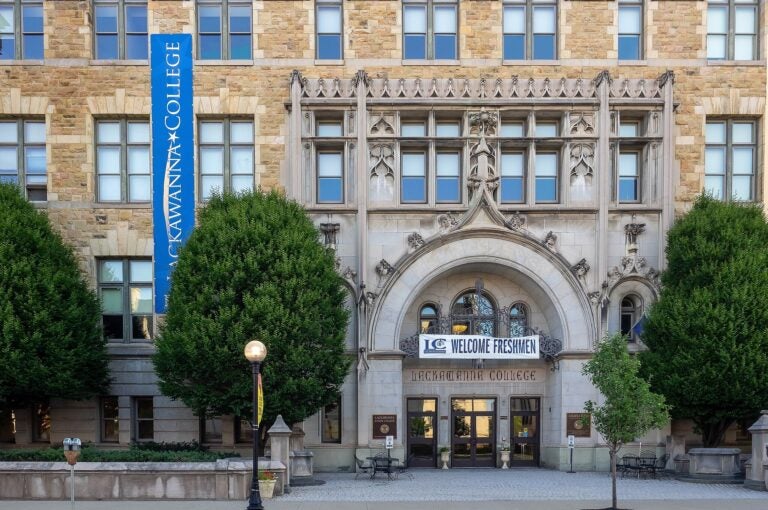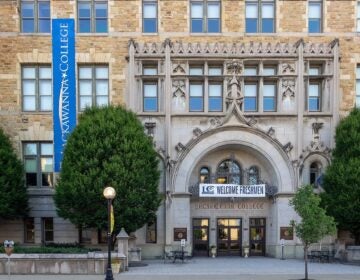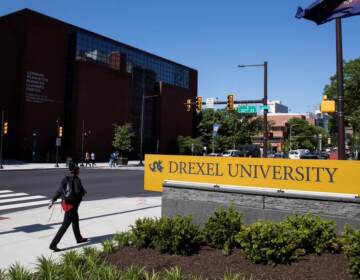Pa. ranked 2nd among nation’s top destinations for freshman out-of-state college students, survey says
About 21,000 freshman students move to the state for college each year, according to data from the Association of Independent Colleges and Universities of Pennsylvania.
Listen 1:12
The campus of Lackawanna College, in Scranton, Pa. (Creative Commons)
From Philly and the Pa. suburbs to South Jersey and Delaware, what would you like WHYY News to cover? Let us know!
For years, Pennsylvania has averaged as the nation’s second-ranked destination for out-of-state freshman college students, according to a survey of government data by a Harrisburg-based education trade group.
The survey found that, based on 17 years of reporting from the U.S. Department of Education, about 21,000 freshman students from across the country move from their home states to attend colleges or universities here each year. It was released Sept. 10 and comes at a time when thousands of U.S. students have settled in for classes.
In 2022, the previous year of survey data from the Association of Independent Colleges and Universities of Pennsylvania, the commonwealth ranked third. New York ranked first.
Thomas P. Foley, AICUP president, said the figures typify the outstanding reputation of the commonwealth’s higher education institutions.
“It means that more American families choose to send their children to Pennsylvania’s independent, nonprofit colleges in all but one other state on average,” Foley said. “Pennsylvania’s colleges are attracting talented people from across the U.S., and we hope these students will decide to stay after graduation.”
The survey shows that students from every state, as well as Washington, D.C., attend one of Pennsylvania’s 85 AICUP schools, which are independent nonprofit colleges. Most out-of-state students come from New Jersey, New York, Maryland, California and Massachusetts, respectively.
Philadelphia City Councilmember Anthony Phillips (D-District 9) previously served as the head of a nonprofit group that helped prepare high school students for college.
“It says a lot about the attractiveness of our universities and our colleges,” Phillips said. “We have incredible urban, rural and suburban spaces, where people want to learn, and also really find ways to develop opportunities for themselves after college. It says a lot about what we are doing to continue to improve our universities and colleges.
“We spent a lot of time trying to find ways to support our colleges, so they can be among the best in the nation,” Phillips added.
This week, Bryn Mawr College and Community College of Philadelphia announced a “pathway partnership” that will offer eligible students the opportunity to earn a Bryn Mawr undergraduate degree in certain majors in two years.
CCP students will be required to earn an associate degree with a grade point average of at least 3.6 and meet other requirements to meet the standard for Bryn Mawr admission. The eligible majors include biology, English literature and mathematics.
Meanwhile, in August, Philadelphia’s Peirce College and Lackawanna College in Scranton, institutions that specialize in serving the needs of busy adults, said they planned to merge.
The combined institution will be known as Lackawanna College and serve about 3,000 undergraduate students and 8,000 graduate students, as well as those taking continuing education courses or seeking professional certificates.
Known for its School of Petroleum and Natural Gas, Lackawanna College offers degrees and certificates for various careers in the industry. According to Lackawanna College, more than 90% of its graduates are employed by the industry.
At Peirce, students can earn a bachelor’s degree that will lead to a Juris Doctor degree at Rutgers Law School. In addition, Peirce offers a master’s degree in Healthcare Administration.
Foley, the AICUP president, said more than 80,000 out-of-state students chose the commonwealth for their higher education during the period of the survey.
“This is a major brain gain for Pennsylvania that sparks real innovation and boosts the local economy,” he said.

Get daily updates from WHYY News!
WHYY is your source for fact-based, in-depth journalism and information. As a nonprofit organization, we rely on financial support from readers like you. Please give today.








